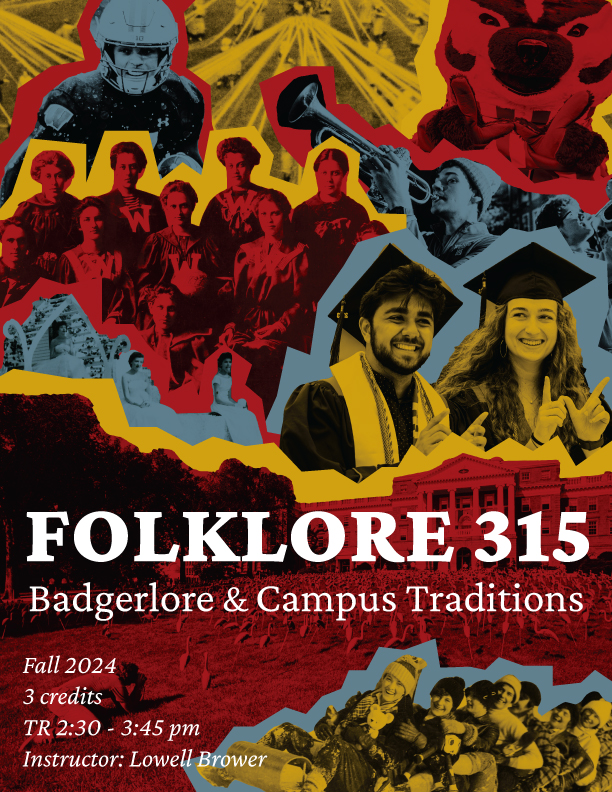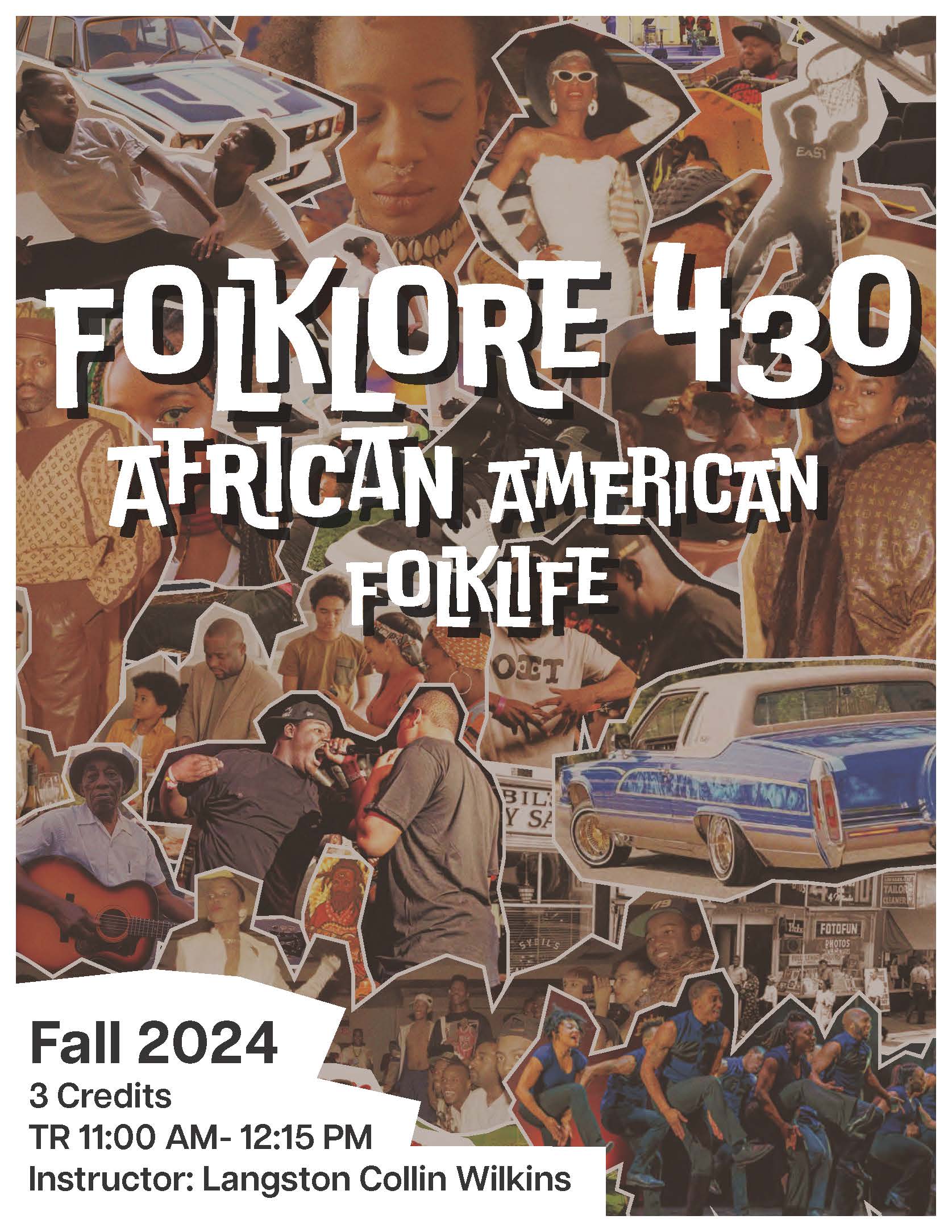Featured Courses



This is an accordion element with a series of buttons that open and close related content panels.
FOLKLORE 100 - Introduction to Folklore
(3 credits)
- Lecture: TR 2:25 – 3:15 pm
- Discussion Section 1: W 8:50 – 9:40 am
- Discussion Section 2: W 3:30 – 4:20 pm
- Discussion Section 3: R 8:50 – 9:40 am
- Discussion Section 4: R 9:55 – 10:45 am
- Discussion Section 5: F 8:50 – 9:40 am
- Discussion Section 6: F 3:30 – 4:20 pm
- Discussion Section 7: W 2:25 – 3:15 pm
- Discussion Section 8: F 9:55 – 10:45 am
- Discussion Section 9: M 4:35 – 5:25 pm
- Discussion Section 10: T 7:45 – 8:35 am
Instructor: Thomas DuBois
Course Description: This course serves as an introduction to folklore; that is, the arts, beliefs, stories, sayings, customs, and ways of communication we engage with in our everyday lives. We’ll be examining a variety of folklore genres, while also learning about and employing the methods and practices of folklore scholars. Because this is a practical as well as theoretical course, we will be conducting fieldwork in the region as part of a semester-long folklore project. By the end of the term, you will be able to better understand what folklore is, how and why it functions, and the many and often hidden ways that it is a part of our everyday lives. You’ll learn about ethnographic methods and techniques and how to use interviews, photography, and videography to document various genres of folklore. You’ll better understand what culture is, how it affects our everyday lives, and how it is transmitted, changed, created and re-created, lost, found, and reclaimed.
FOLKLORE 103 - Introduction to Music Cultures of the World
(3 credits)
- Lecture: MW 1:20 – 2:10 pm
- Discussion Section 1: R 8:50 – 9:40 am
- Discussion Section 2: R 9:55 – 10:45 am
- Discussion Section 3: R 11:00 – 11:50 am
- Discussion Section 4: R 12:05 – 12:55 pm
- Discussion Section 5: R 2:25 – 3:15 pm
- Discussion Section 6: R 9:55 – 10:45 am
- Discussion Section 7: R 11:00 – 11:50 am
- Discussion Section 8: R 1:20 – 2:10 pm
- Discussion Section 9: F 11:00 – 11:50 am
- Discussion Section 10: F 12:05 – 12:55 pm
- Discussion Section 11: F 2:25 – 3:15 pm
- Discussion Section 12: F 3:30 – 4:20 pm
Instructor: Nathan Gibson
Course Description: Course description to come!
FOLKLORE 210 - The African Storyteller
(3 credits)
Online Only
Course Description: Course description to come!
FOLKLORE 235 - World of the Sagas
(3 credits)
MW 2:30 – 3:45 pm
Instructor: Scott Mellor
Course Description: This course will give you an introduction to Medieval Nordic Mythology and put it in a European context. Scandinavian Mythology will introduce you to the belief systems of early and medieval Scandinavia in a European Context and take a look at the literary works written by Christian Scandinavians about their former Religion. We will look at the Kalevala, the mythological and heroic poetry of the Edda and the Icelandic legendary sagas, as well as a few early Christian texts.
Prerequisites: None
(First-year Interest Group)
FOLKLORE 315 - Badgerlore Campus Traditions
(3 credits)
TR 2:30 – 3:45 pm
Instructor: Lowell Brower
Course Description: Course description to come!
FOLKLORE 317 - The Irish Tradition
(3 credits)
TR 1:00 – 2:15 pm
Course Description: Course description to come!
FOLKLORE 319 - Afro Asian Improv: From Hip Hop to Martial Arts Fusion
(3 credits)
MW 2:25 – 4:05 pm
Instructor: Peggy Choy
Course Description: Course description to come!
FOLKLORE 326 - The Supernatural in the Modern World
(3 credits)
W 5:45 – 8:15 pm
Instructor: Lowell Brower
Course Description: What do our ghost stories say about us, what do our beasts betray about us? Which witches bewitch us, which rumors consume us, and what sense can be made of what haunts us? Restless spirits, alien invaders, wicked witches, bloodthirsty vampires, legendary cryptids, murderous ogres, Illuminati satanists, deep-state conspirators, memetic online menaces: our contemporary bestiary is overflowing with meaningful monsters. Our spine-tingling intellectual task in this course will be to analyze the roles that these malevolent entities and the supernatural narratives we tell about them play in our everyday lives, our collective psyches, our communities, our politics, and in the crises we confront as individuals and groups. Are our occult stories allegories of our modern discontents, or simply holdovers from our childhood nightmares? Are they symptoms of specific societal crises, or representations of timeless pan-human fears? How has the witch hunt, the rumor panic, the “standardized nightmare of the group” transformed in this meme-ified age of online participatory culture, global interconnection, ecological catastrophe, and fake-news-driven conspiracy thinking? What can we learn about ourselves, our pasts, and our futures by thinking deeply about what scares us the most? And how frightened should we be of what we might find if we dig too deeply into that question?
While trembling together in the creepiest classroom on campus, we will analyze “the supernatural” in relation to historical memories, cultural anxieties, folk traditions, spiritual beliefs, physiological sensations, political conflicts, environmental disasters, existential imperatives, and just about everything else under the moon. Because nowhere is safe from the things that go bump in the night, our interdisciplinary journey will take us across time and space into the bellies of various beasts, from the stacks of Memorial Library, to the hills of Rwanda, to the message boards of 4chan, to the proms of rural Pennsylvania, to the ships of the Middle Passage, to the villages of medieval Europe, to the halls of the White House, to your creepy neighbor’s basement, to the deep dark woods.
Our abominable assignments will include creative reading responses, the documentation and analysis of frightful folklore, a fearsome final project, and a co-created creepy campus tour. Course activities may include local excursions, storytelling sessions, and paranormal experimentation. Enroll if you dare.
Prerequisites: Junior standing.
FOLKLORE 342 - Nordic Mythology
(3 credits)
TR 2:30 – 3:45 pm
Instructor: Scott Mellor
Course Description: This course will give you an introduction to Medieval Nordic Mythology and put it in a European context. Scandinavian Mythology will introduce you to the belief systems of early and medieval Scandinavia in a European Context and take a look at the literary works written by Christian Scandinavians about their former Religion. We will look at the Kalevala, the mythological and heroic poetry of the Edda and the Icelandic legendary sagas, as well as a few early Christian texts.
Prerequisites: Sophomore standing
(Honors option)
FOLKLORE 430 - African American Folklife
(3 credits)
TR 11:00 am – 12:15 pm
Instructor: Langston Collin Wilkins
Course Description: This course examines post-civil rights era urban African American folklife from across the United States. Each week, we will explore spaces and places of African American folk production, focusing on multiple genres of expression. Class discussions will interrogate the ways in which these selected folk practices build upon earlier forms, their complex relationships with each other, and their function within the communities of origin. We will also critically examine how these practices intersect with important societal phenomenon- namely issues of race, class, gender, power, and migration. In addition, students will conduct ethnographic fieldwork project and produce media related to African American folklife in Wisconsin. The goal of this course is to use the lens of African American folklife to gain a better understanding of the dynamic and multi-faceted nature of contemporary African American life in general.
Prerequisites: Sophomore standing.
FOLKLORE 437 - American Indian Women
(3 credits)
MWF 9:55 – 10:45 am
Instructor: Sasha Suarez
Course Description: Course description to come!
FOLKLORE 490 - Field Methods and the Public Presentation of Folklore
(3 credits)
TR 4:00 – 5:15 pm
Instructor: Langston Collin Wilkins
Course Description: This course is an immersive exploration of public and applied folklore practice. Course material and activities will focus on the cultural, political, and ethical dimensions underlying the documentation and public presentation of folklore through festivals, exhibitions, publications, audio-visual productions, and digital archival collections. Students will conduct fieldwork, produce media, and develop programming meant for public engagement.
Prerequisites: Sophomore Standing
FOLKLORE 522 - Digital Storytelling for Social Media
(3 credits)
TR 1:00 – 2:15 pm
Instructor: Robert Howard
Course Description: Course description to come!
FOLKLORE 540 - Local Culture and Identity in the Upper Midwest
(3 credits)
MW 2:30 – 3:45 pm
Instructor: Anna Rue
Course Description: Course description to come!